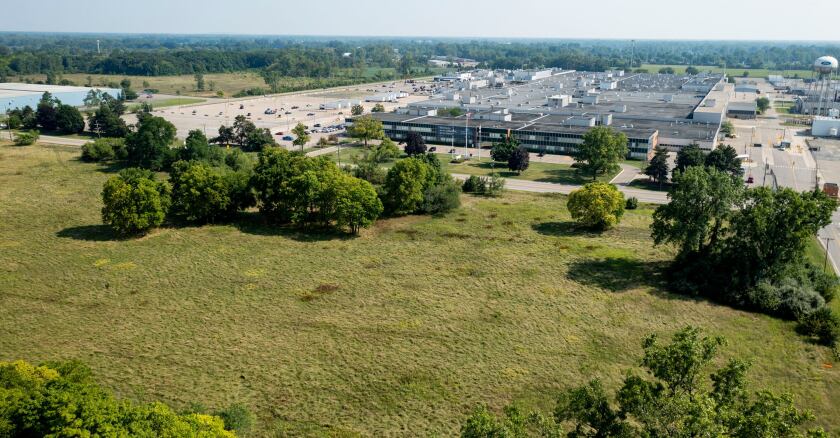Science
University of Michigan Reassesses Controversial Data Center Plans

The University of Michigan is re-evaluating the location for its proposed data center campus, a project estimated to cost $1.2 billion. This facility, which aims to advance research in artificial intelligence, energy, and national security, has faced significant local opposition and concerns over its environmental impact. University officials confirmed they are negotiating potential sites, including a location near the American Center for Mobility, west of Willow Run Airport, while still favoring a site off Textile Road.
The planned campus consists of two buildings: one designated for classified government research and another for non-classified projects. The university has maintained that the Textile Road site is preferable due to its existing light industrial zoning and infrastructure. Chris Kolb, the university’s vice president for government relations, stated that preliminary plans would maximize distance from nearby parks and protect natural features, including the Huron River.
Despite these reassurances, tensions have escalated within the community. Township attorney Doug Winters expressed frustration at a recent Board of Trustees meeting, revealing that the university had been negotiating with the American Center for Mobility for over a year without informing township officials. He criticized the university for what he termed a “bait and switch” regarding the project’s location.
The township board has voiced strong opposition to the Textile Road site, citing concerns over environmental, health, and safety issues. They passed a resolution unanimously against the proposed location, with officials emphasizing the detrimental effects on local residents and businesses. Winters mentioned that the township has limited authority to intervene, as the university is exempt from local zoning regulations.
Local residents have also expressed fears about the implications of classified government research. During a recent township meeting, some called for broader opposition to any data center within the area. Township Supervisor Brenda Stumbo suggested that the former General Motors site might be more appropriate for such a facility, given its industrial history.
In response to these ongoing discussions, the township board has taken several proactive measures. They voted to hire environmental attorney Grant Trigger to assist with potential negotiations and to analyze environmental reviews should the university continue pursuing the Textile Road site. The board also authorized their legal counsel to prepare for possible actions if the university opts to advance its plans at the Textile Road location.
Furthermore, the planning commission is being directed to consider amending local zoning ordinances to restrict where future data centers can be established. Currently, data centers are permissible in areas designated for industrial and commercial revitalization, as well as logistics and manufacturing. The proposed amendments could limit data centers to only ICR-zoned land, which is closer to existing utilities.
The university and the national laboratory aim to have the data center campus operational by 2030, with construction slated to commence in 2026. As negotiations continue, the university remains committed to engaging with township officials and the community to address concerns surrounding the project.
-

 Entertainment2 months ago
Entertainment2 months agoAnn Ming Reflects on ITV’s ‘I Fought the Law’ Drama
-

 Entertainment3 months ago
Entertainment3 months agoKate Garraway Sells £2 Million Home Amid Financial Struggles
-

 Health2 months ago
Health2 months agoKatie Price Faces New Health Concerns After Cancer Symptoms Resurface
-

 Entertainment2 months ago
Entertainment2 months agoCoronation Street’s Carl Webster Faces Trouble with New Affairs
-

 Entertainment2 months ago
Entertainment2 months agoWhere is Tinder Swindler Simon Leviev? Latest Updates Revealed
-

 Entertainment3 months ago
Entertainment3 months agoKim Cattrall Posts Cryptic Message After HBO’s Sequel Cancellation
-

 Entertainment1 month ago
Entertainment1 month agoOlivia Attwood Opens Up About Fallout with Former Best Friend
-

 Entertainment2 months ago
Entertainment2 months agoMasterChef Faces Turmoil as Tom Kerridge Withdraws from Hosting Role
-

 Entertainment3 months ago
Entertainment3 months agoSpeculation Surrounds Home and Away as Cast Departures Mount
-

 World2 months ago
World2 months agoCole Palmer’s Mysterious Message to Kobbie Mainoo Sparks Speculation
-

 Entertainment2 months ago
Entertainment2 months agoITV’s I Fought the Law: Unraveling the True Story Behind the Drama
-

 Entertainment3 months ago
Entertainment3 months agoMarkiplier Addresses AI Controversy During Livestream Response









